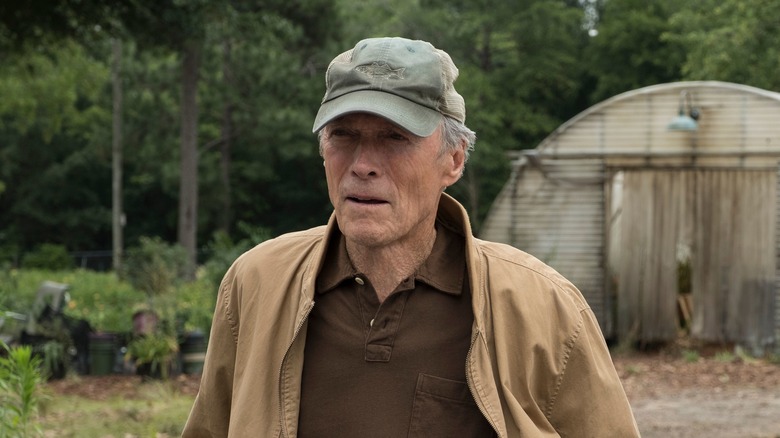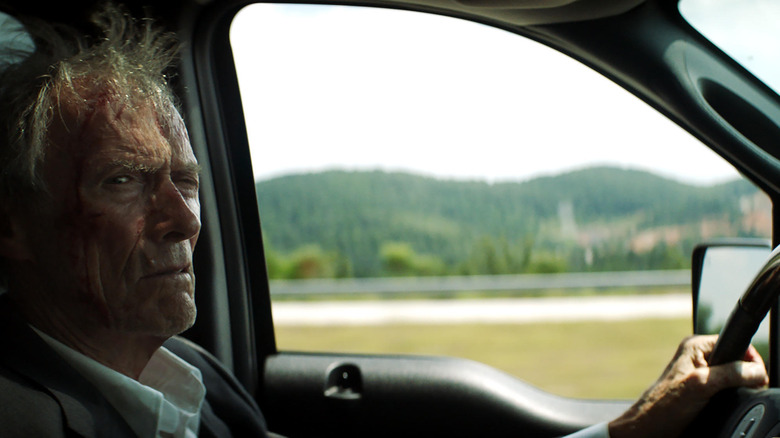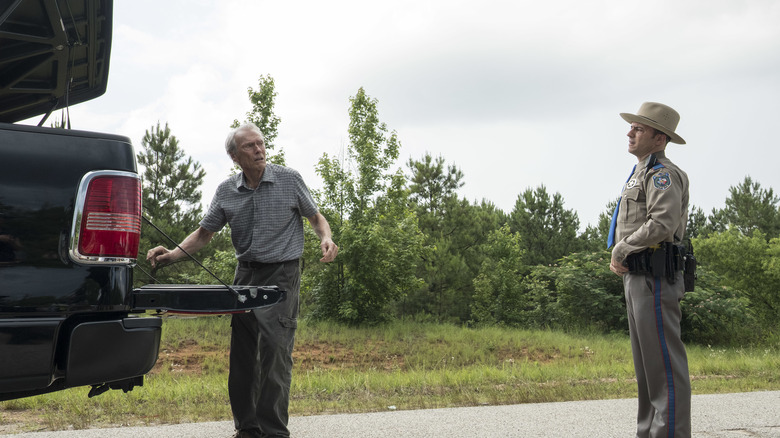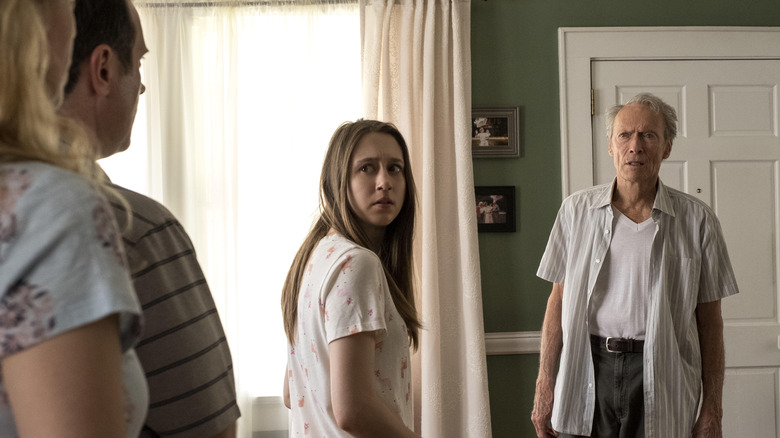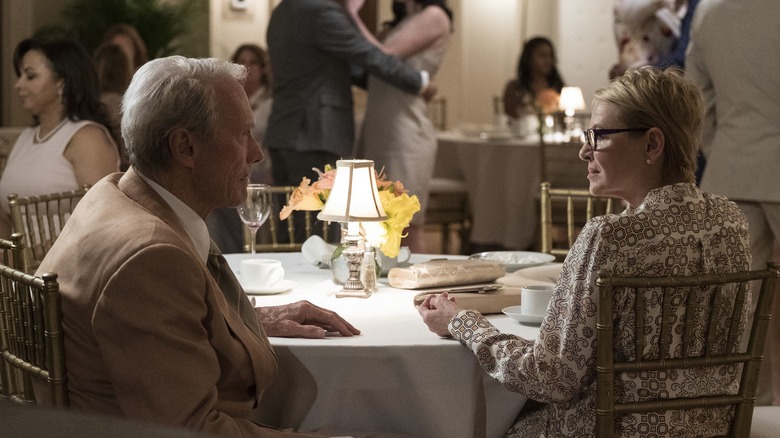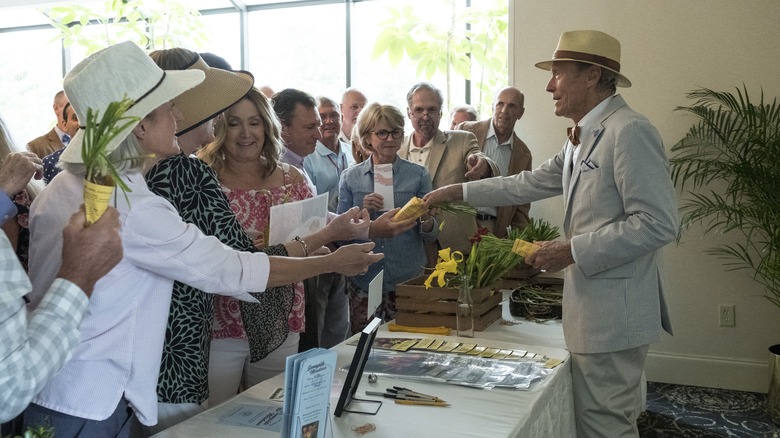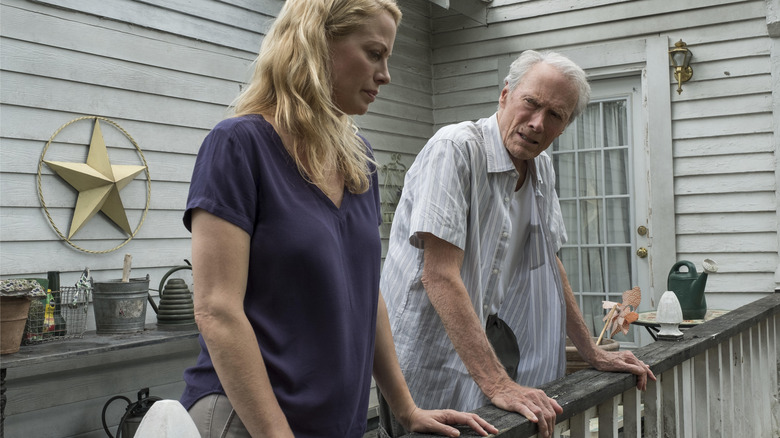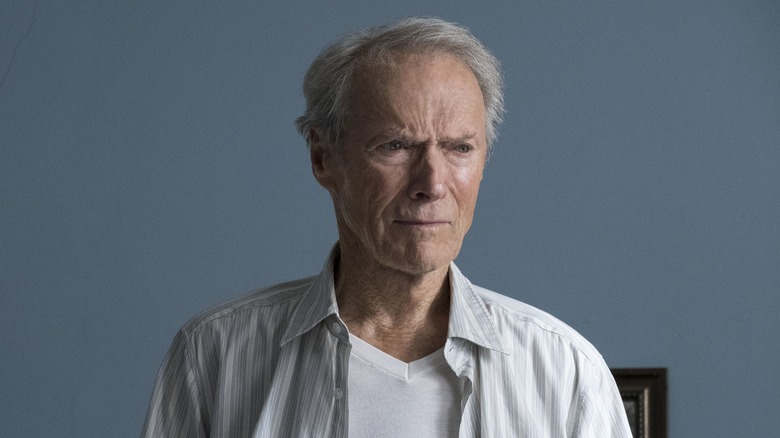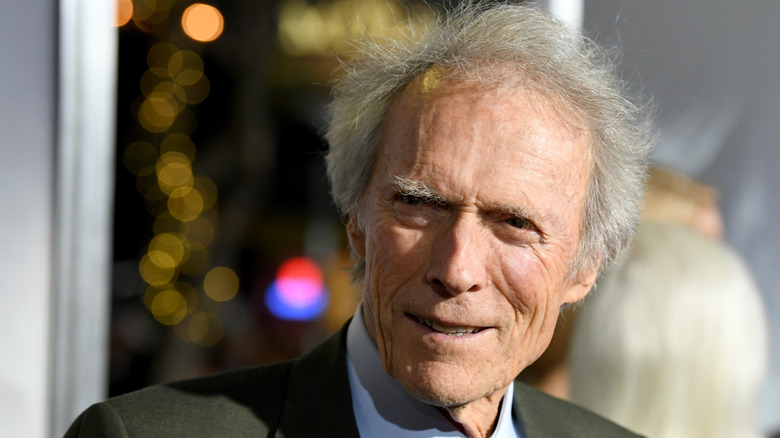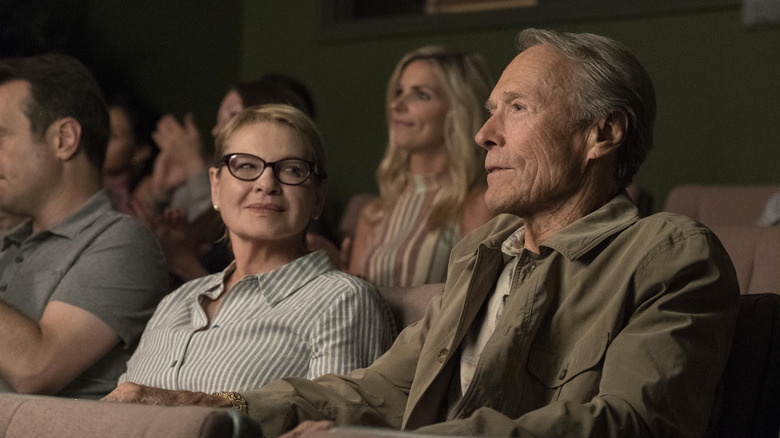The Ending Of The Mule Explained
Movies about 90-year-old drug traffickers don't come along all that often but when they do they command your attention. Particularly if it's based on a true story, and Clint Eastwood is directing and playing the lead role. Released in 2018 when Eastwood was a sprightly 88, "The Mule" sure as hell kicks like one and is anything but a lame horse. It gallops along at a breakneck pace as Earl Stone stumbles into an underground world he has no real place or business in. There are no epic car chases, legendary shootouts, death-defying escapes or Machiavellian double-crosses in "The Mule," just a lot of engaging, empathetic and understated performances that grab the viewer's attention from the first frame to the last.
On one level, "The Mule" is a movie about an everyday man who gets in over his head. But its theme of how bad choices can lead us down some seriously shady paths is universal, as is its riff on the illusory nature of age and how life can pass you by in a blink of an eye and leave you consumed by regret. "The Mule" is also a film about doing the wrong thing for the right reasons, and how it's never too late to make amends and put things right. Its ending is bittersweet and worthy of a deeper debate. So grab the reins and hold on tight as we find out exactly what the ending of "The Mule" really means.
What you need to remember about the plot of The Mule
"The Mule" begins with horticulturist Earl Stone (Clint Eastwood) being honored at an awards ceremony for his finesse with flowers. Things take a darker turn when we realize Stone has snubbed his only daughter's wedding for the event. Fast forward 12 years and Stone is broke and beaten up by life. He has lost his flower business and his family. To make amends for past mistakes, he accepts a drug cartel member's proposition to transport some cocaine, believing the money he makes will help give his granddaughter the wedding of her dreams. What was supposed to be a one-time deal becomes a regular paycheck as Stone gets a taste of the big-dollar life that being a drug mule can bring.
He gives his granddaughter a lavish wedding, pays for the renovation of his local club, stops the foreclosure of his home, buys himself a new truck, and takes a trip to Mexico to party with the cartel. Stone's journey poignantly proves corruption is insidious, blinding those it damages most. Yet the DEA has eyes on the man the cartel has nicknamed "Tata" (grandfather) and it's only a matter of time before he's busted. In the meantime the good grace and friendly indulgence Stone previously enjoyed from the cartel evaporates when a new, more ruthless boss takes over. Kept on a much tighter leash, Stone has a tough and defining choice to make when he's on a drug run and finds his wife is terminally ill and dying.
What happened at the end of The Mule
When Stone gets the call from his granddaughter Ginny, informing him that his estranged wife Mary hasn't got long left and it's time to say goodbye, it comes at the worse possible time for the happy-go-lucky drug mule. He's got $12 million worth of the cartel's coke in his trunk and his new boss Gustavo isn't the understanding type. Forced to either rush to his dying ex-wife's side or deliver the drugs, Stone at first stays true to type and tells his daughter his hands are tied and there's nothing he can do. Yet after Ginny accuses him of being just as selfish as her mother said he was, he has an epiphany of sorts.
Stone throws caution to the wind and finally does the right thing. Ignoring the missed calls and threatening texts from his handlers, Stone does a complete U-turn in every sense and is there for his wife when she needs him most. Before she dies, Mary tells her husband, "You didn't have to get rich for us to want you around." The cartel gives Stone a beating for his disobedience but they don't kill him. His work as a mule has proven to be invaluable and he's tasked with finishing his drop-off. However, the DEA catches up with him before the deed is done and Stone ends up in court. Pleading guilty to all charges, the film ends with Stone tending to a flower garden in jail.
Earl is a man out of time and place
Earl Stone is out of step with the modern world, believing his flower business and way of life were destroyed by the internet. Stone also has no truck with mobile phones and believes they are killing the art of communication and interaction. Clint Eastwood is no stranger to playing the sort of character who feels out of place and out of time: Stone's closest celluloid relative is Walt Kowalski in "Gran Torino." Like Stone, Kowalski is also a Korean war veteran alienated by what he perceives as a world gone wrong. Yet rather than question how their motives, actions, and decisions create the lives they lead, they both vent their anger at an indifferent world.
Stone's confusion at the notion of a modern man not being able to change the tire on his car is evident when he stops to help the young couple at a roadside and asks, "Didn't your daddy teach you how to do it?" He also shows shades of Kowalski's casual racism when he calls the couple, to their great disbelief, "negro folk." Yet Stone doesn't just run drugs, he has threesomes with prostitutes and doesn't give an inch when younger men try to intimidate him. He just looks them straight in the eye with that steely, uncompromising Eastwood glare. Stone's refusal to lay down and die is as much about him as it is about a director who still has enough fire in his belly to be making and appearing in films in his late 80s.
What the end of The Mule means
At the end of "The Mule," Earl Stone runs out of road in both a physical and metaphysical sense. The devil always collects and when the DEA comes calling it's time for Stone to pay his dues. The open-road symbolism in "The Mule" is a constant reminder that it's a movie about a man on a personal journey. Stone has spent a lifetime outrunning his responsibilities and only during his last days, and in pretty extreme circumstances, does he finally admit his failure and look for a shot at redemption. After doing the right thing by abandoning his last drug run and visiting his dying wife, Stone finally makes amends. His selfish lifestyle has cost him dearly, but there's light at the end of the tunnel even if it means doing jail time.
Stone had always been a live-in-the-moment kind of guy who would leave tomorrow to take care of itself. Yet when his past catches up with him and forces him to confront the choices he's made and the life he's led, he realizes it's time to balance the books. Stone knows there must be accountability and that's why, against the advice of his lawyers, he pleads guilty in court. Stone knows he has to face some form of punishment, not so much for the drug running but the way he neglected his family. As he tells his daughter in the last scene, "I could buy anything, but I couldn't buy time."
Why is Earl obsessed with flowers?
Like Leo Sharp, the real drug mule who Clint Eastwood's character is based upon, Earl Stone spent the majority of his working life as a horticulturist. "The Mule" begins with Stone tending to flowers as a free man and ends with him caring for them in captivity. Flowers have a special significance in "The Mule" and offer a penetrating insight into the real personality behind Stone's no-nonsense, tough guy facade. At heart, Stone is an individual who loves his lilies because they bloom gloriously for a brief time before they wither and die. Flowers are symbolic of Stone's love for the intoxication of the moment, glamour, and his inability to make any long-term plans or invest in the future. His tragedy is he's aware of this shortcoming in others but has spent most of his life blind to it in himself.
In the coffee shop he tells Agent Bates to never "put work in front of family," and in another scene, he advises cartel member Julio (Ignacio Serricchio) to get out and do something meaningful with his life. It's advice that Stone would have done well to follow as a young man. Stone is passionate about his love for flowers until the end; for him they're unique, and although their bloom only lasts a short time, they deserve all the time and effort he can commit. Unfortunately, Stone fails to apply the adage "you reap what you sow" to his own family until it's almost too late.
Does Earl do the wrong thing for the right reasons?
Earl Stone gets into the drug-running business to help pay for his grandaughter's wedding, after spectacularly missing his own daughter's wedding due to his selfish nature. It was only supposed to be a one-time deal but he gets a taste of the lavish lifestyle and becomes addicted. Corruption is a slow disease, and as the packages get bigger, the man who once prided himself on having picked up no parking tickets in seven decades of driving has no qualms about delivering one truckload of cocaine after another. It kind of suggests Stone's moral compass is a little askew to begin with.
He's invited into the drug trade after a cartel member senses that Stone's everyman demeanor, air of respectability, and white American face would fly nicely under the radar as a drug mule. Stone needs little persuading or grooming for a life of crime — he's almost chomping at the bit to make some easy bucks and turn things around. It may seem at face value that Stone is doing the wrong thing for the right reasons, but is it the danger and adrenaline high of being an outlaw that appeals to Stone more? That, and of course, the vast reservoirs of wealth that come trickling his way. Remember, he doesn't stop after he's made the money he needs, but keeps going until he's all out of moves.
Would Earl do things differently if he had his time again?
Would Earl do things differently if he had his time all over again? Eastwood's trademark snarl, which makes its first and only appearance at the end of the film when Earl is busted by the DEA, appears to suggest not. It's not a face of stoic acceptance, or relief that he will be finally punished for his crimes, but more a defiant scowl of a player whose game is over before they could finish.
It's important to remember that Stone does not give himself up but is caught. He keeps pushing his luck and driving the drugs even when his ex-wife has passed. His decision to plead guilty in court would seemingly suggest he's remorseful. However, the indignity of lying wouldn't sit well with a character such as Stone. Neither would he view kindly any man who was not staunch enough to accept the consequence of his actions.
Stone doesn't plead guilty because he has any high-minded notion that he's done something wrong. He simply doesn't have the stomach to sit through any courtroom facade pretending he was nothing more than a hapless victim of circumstances. Stone is made of sterner stuff and although he carries a visible air of regret throughout the film, he's wise and practical enough to know it's the burden and comfort of an old man. Given the opportunity, Stone probably could have fallen just as easily into drug running as a young man.
What Clint Eastwood said about the ending of The Mule
When asked about the story of real-life drug mule Leo Sharp, on who the character Earl Stone is based, Clint Eastwood told CinemaBlend, "I think it's a mystery what happened." The director confessed that it was the intrigue behind Sharp's story that got him interested in making the movie. Sharp, who passed away not long after leaving prison, was never really questioned on why he did what he did, and Eastwood said he was unable to ascertain what really happened. Eastwood explained, "I still don't know him but I just played what I thought he would be, and working for the cartel is such a dangerous thing because everybody, both countries, Mexico and the United States are against you or looking for you in some way or another."
"The Mule" screenwriter Nick Schenk based his screenplay on Sam Dolnick's 2014 article in The New York Times about Sharp. After the release of "The Mule," Dolnick wrote, "As a journalist, I was never able to crack Leo Sharp ... Even with all my reporting, I couldn't fully tell you what motivated Mr. Sharp. I don't think anyone could. Not even Leo Sharp himself. That's where Hollywood stepped in."
The ending versus the real story
There's a phrase beloved by movie makers: "loosely based on a true story." "The Mule" is a fine example of that special kind of movie that adds a dash of truth, a pinch of poignant backstory, a twist of dramatic flair, a measure of emotional engagement, and a topping of storytelling genius. Nevertheless, it differs from the real story of Leo Sharp. Sam Dolnick, who first introduced Sharp's story to the world, explained, "Fiction filled in the spaces where journalism couldn't go."
However, some facts remain accurate: Sharp was a well-known figure in the world of flowers, particularly lilies. Sharp was also a war veteran, but unlike Stone, who fought in Korea, he served during World War II. Sharp also got into the drug trade when his flower business was failing, but was trafficking for over a decade before he was busted. Sharp was still married to his wife, who was still alive when he died in 2016. He also had a daughter, but there's no evidence of any rift.
Sharp did initially use the drug money to buy back his farm, but his arrest wasn't a dramatic affair. He was pulled over by a state trooper on the orders of the DEA and found in possession of five duffle bags worth of drugs. Clint Eastwood told USA Today the real difference between Sharp and Stone: "We don't know what [Sharp] incurred when he was on the road doing all those trips."
